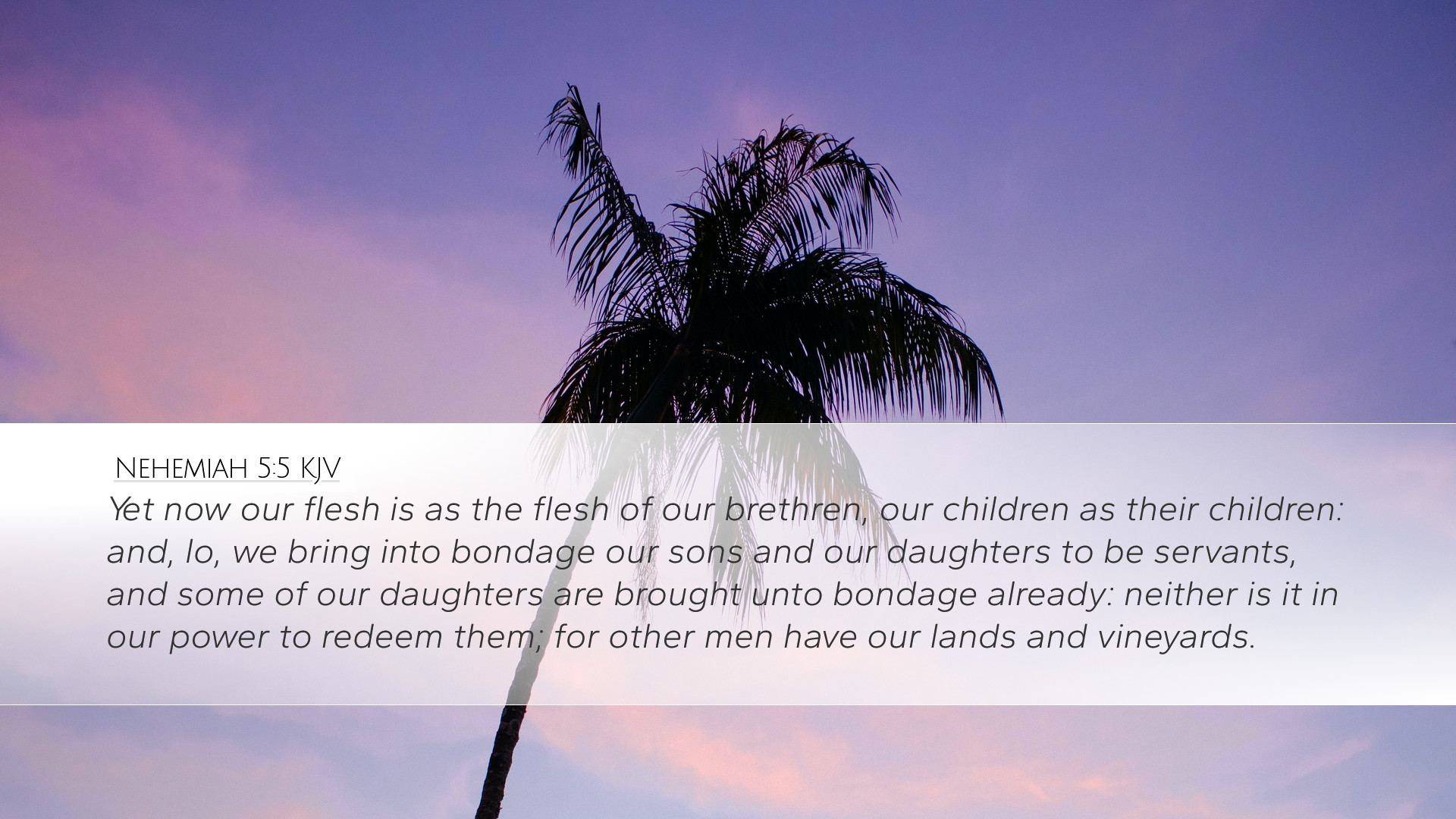Old Testament
Genesis Exodus Leviticus Numbers Deuteronomy Joshua Judges Ruth 1 Samuel 2 Samuel 1 Kings 2 Kings 1 Chronicles 2 Chronicles Ezra Nehemiah Esther Job Psalms Proverbs Ecclesiastes Song of Solomon Isaiah Jeremiah Lamentations Ezekiel Daniel Hosea Joel Amos Obadiah Jonah Micah Nahum Habakkuk Zephaniah Haggai Zechariah MalachiNehemiah 5:5
Nehemiah 5:5 KJV
Yet now our flesh is as the flesh of our brethren, our children as their children: and, lo, we bring into bondage our sons and our daughters to be servants, and some of our daughters are brought unto bondage already: neither is it in our power to redeem them; for other men have our lands and vineyards.
Nehemiah 5:5 Bible Commentary
Commentary on Nehemiah 5:5
Verse Context: Nehemiah 5:5 details a troubling situation within the Jewish community during the rebuilding of Jerusalem’s walls. It reflects a serious social injustice where the poor are oppressed and their rights are compromised in the context of great change and struggle.
Analysis and Commentary
The verse states: “Yet now our flesh is as the flesh of our brethren, our children as their children: and, lo, we bring into bondage our sons and our daughters to be servants, and some of our daughters are brought unto bondage already: neither is it in our power to redeem them; for other men have our lands and vineyards.” This profound statement expresses the desperation and plight of the Jewish people as they navigate their socio-economic challenges.
Social and Economic Context
Matthew Henry’s commentary draws attention to the corruption and exploitation that undermined the social fabric of the community. Wealthy landowners were taking advantage of their brethren, leading to a cycle of poverty and servitude. This was significant, as the bonds of unity were being threatened by economic injustice.
Oppression and Servitude
Henry emphasizes the concept of bondage; the Jewish people were forced to return to servitude, much against the principles laid down in the Law of Moses, which established the rights of individuals and families. This fact underscores the moral failing of those in power. It highlights how deeply interwoven social structures are in communities and how easily they can distort righteousness.
Theological Implications
Adam Clarke identifies the central spiritual crisis here: the loss of liberty among God’s chosen people. This crisis not only involves financial enslavement but also the spiritual implications of turning away from God’s commandments. Clarke notes that the injustices stem from failing to uphold the principles of love, equity, and mercy central to Jewish teaching.
The Challenge of Redemption
The phrase “neither is it in our power to redeem them” suggests an existential crisis, indicating that even the leaders feel overwhelmed and powerless to change their circumstances. Clarke interprets this as a call to godly leadership—one that seeks not only economic stability but spiritual restoration as well. It stresses the importance of moral integrity in leadership roles.
Sociological Reflections
Albert Barnes offers a sociological view of Nehemiah's time, highlighting how community dynamics can shift during periods of crisis. There is a tendency for the strong to exploit the weak. Barnes reminds readers that such systemic issues can lead to resentment and division within the people of God, which can ultimately hinder the work of God.
The Need for Righteous Leadership
Barnes points to the necessity of leadership that listens to both the cries of the oppressed and the interests of the community. True leadership in a Biblical sense understands the weight of responsibility, aiming to heal the wounds caused by oppression while guiding the community towards restoration and unity.
The Call for Social Justice
The social injustices highlighted in this verse challenge contemporary readers, particularly in pastoral contexts. Nehemiah’s response is critical in times of strife. It serves as an invitation for modern church leaders to advocate for justice and equality within their own communities echoing the timeless nature of God’s concern for the poor and oppressed.
Practical Applications for Pastors and Leaders
- Awareness: Stay aware of the social dynamics and economic injustices that may exist within your congregation.
- Advocacy: Encourage advocacy for the oppressed in your community, echoing Nehemiah's heart in tackling the injustices head-on.
- Community Restoration: Support initiatives that restore dignity and equity among all members of your congregation.
- Spiritual Guidance: Teach principles derived from this passage about loving one’s neighbor and caring for the needy as essential spiritual tenets.
Conclusion
The poignant message of Nehemiah 5:5 urges believers to evaluate their relational and social practices in light of Scripture. The historical context provides profound lessons on sin, redemption, and the need for righteous action. As God’s people reflect on this ancient text, the call for justice, equity, and unity resonates beyond time and culture, reminding them of the need to be agents of change in their communities.


